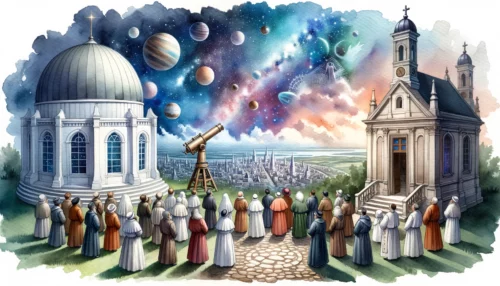Many view Christianity through a lens shaped by cultural, historical, and personal experiences, leading to a mosaic of beliefs and assumptions. These preconceptions, however, frequently stray from the core teachings and essence of the faith. It is crucial to address these misunderstandings, not only to clarify the Christian perspective but also to foster a more accurate and respectful dialogue between different beliefs and worldviews. This examination aims to illuminate and correct some of the most common misconceptions about Christianity, drawing from Biblical teachings and historical context.
Misconception 1: Christianity and Science Are Incompatible
The belief that Christianity and science cannot coexist is a prevalent misconception. In reality, Christianity historically has not only coexisted with scientific inquiry but also encouraged it. The Biblical view that the universe is a coherent creation of God (Genesis 1:1) has been a driving force behind the pursuit of scientific understanding. Many early scientists were devout Christians, seeing their work as a way to understand God’s creation more deeply.
The heart of this misconception lies in the misunderstanding of both science and faith. Science is a tool for understanding the natural world, using observation, experimentation, and empirical evidence. Christianity, on the other hand, deals with spiritual truths and moral guidance. These two realms address different aspects of human experience and can be seen as complementary rather than contradictory. The Bible encourages the pursuit of knowledge and wisdom (Proverbs 1:7), aligning well with the scientific endeavor to understand the world.
In terms of the creation story in Genesis, some interpret these accounts as literal, while others see them as symbolic, conveying deeper spiritual truths rather than scientific details. The Christian faith does not dictate a specific stance on scientific issues but rather provides a moral and spiritual framework within which scientific exploration can take place.
Additionally, the Christian concept of God as a rational being who created an orderly universe forms a foundation conducive to scientific exploration. This belief in an orderly universe, governed by consistent laws, was crucial in the development of modern science. Many pioneers in science, including Isaac Newton and Galileo Galilei, were driven by their faith to understand the natural world, seeing their work as uncovering the laws God put in place.
Christianity also teaches the value of human beings, created in God’s image (Genesis 1:27), which has implications for how scientific research is conducted, emphasizing ethical considerations and the dignity of life. This perspective has informed debates on various scientific and technological advancements, ensuring that they serve humanity positively and ethically.
Christianity and science, rather than being at odds, have a rich history of coexistence and mutual enrichment. The Biblical view of a coherent and orderly creation underpins the pursuit of scientific understanding. Christian doctrine encourages the acquisition of knowledge and wisdom, providing a moral framework for scientific endeavors. The relationship between Christianity and science is one of complementarity, with each addressing different aspects of human experience.
Misconception 2: Christianity Promotes Blind Faith
A common misconception about Christianity is that it advocates for blind faith, discouraging questioning or rational thought. Contrary to this belief, Christianity values and encourages a reasoned, informed faith. Throughout the Bible, there are numerous instances where questioning and seeking understanding are portrayed positively.
The character of Thomas in the New Testament (John 20:24-29) is a prime example. Often labeled as “Doubting Thomas,” his story is not a condemnation of doubt but an acknowledgment of the importance of personal conviction and understanding. When Thomas sought tangible proof of Jesus’ resurrection, Jesus did not rebuke him for his doubts but provided the evidence he needed. This account illustrates that seeking understanding and evidence is not antithetical to Christian faith.
Furthermore, the Bible frequently encourages believers to seek wisdom and understanding (Proverbs 2:2-6). The pursuit of knowledge and understanding is seen as a way to deepen one’s faith, not diminish it. Christianity posits that a well-informed belief is stronger and more resilient than one that is unexamined.
Christianity also acknowledges human limitations in understanding the divine. The Apostle Paul speaks of seeing “through a glass, darkly” (1 Corinthians 13:12), suggesting that while complete understanding is beyond our current grasp, striving for knowledge and clarity is still valuable. This sentiment underscores the idea that faith and reason are not mutually exclusive but are instead complementary aspects of the Christian journey.
Historically, many Christian theologians and philosophers have engaged deeply with questions of faith, reason, and the nature of God. Augustine, Aquinas, and C.S. Lewis, among others, devoted their lives to exploring and articulating a reasoned, thoughtful faith. Their works demonstrate that intellectual exploration is an integral part of Christian tradition.
The Christian faith, therefore, does not demand blind adherence to its teachings. Instead, it invites believers to explore, question, and seek a deeper understanding of their faith. This process of exploration and questioning often leads to a more profound and robust faith.
Christianity values reasoned and informed faith, contrary to the misconception of promoting blind faith. Biblical narratives and teachings encourage the pursuit of understanding and wisdom, showing that faith and reason are complementary. The Christian tradition, enriched by theologians and philosophers, supports intellectual engagement with faith. This reasoned approach leads to a deeper, more resilient belief.
Misconception 3: Christianity Is Monolithic in Belief and Practice
One of the most widespread misconceptions about Christianity is that it is a monolithic religion with uniform beliefs and practices. In reality, Christianity is remarkably diverse, encompassing a wide range of traditions, interpretations, and practices. This diversity is a result of Christianity’s long history and its spread across different cultures and continents.
From its inception, Christianity has been a faith characterized by diverse interpretations and theological perspectives. The New Testament itself contains various letters and gospels, each providing different insights and emphases about Jesus’ life and teachings (the Gospels of Matthew, Mark, Luke, and John). These differences in emphasis and perspective were not seen as contradictions but as complementary views of a multifaceted truth.
This diversity continued to grow as Christianity spread throughout the world. Early church history saw significant theological debates, such as those regarding the nature of Christ and the Trinity. These debates led to the formation of different Christian denominations, each with its own theological emphasis and traditions. Major branches of Christianity today include Roman Catholicism, Eastern Orthodoxy, and Protestantism, each with its own sub-denominations and unique practices.
Cultural influences have also played a significant role in shaping the practices and expressions of Christian faith. For instance, Christianity in Latin America has distinct characteristics influenced by indigenous cultures and Spanish colonial history. Similarly, African Christianity integrates local traditions and cultural expressions, making it distinct from its European or American counterparts.
The diversity within Christianity is also evident in its worship styles, ranging from the liturgical, structured services of the Orthodox and Catholic churches to the more spontaneous and informal worship found in many Protestant churches. Additionally, Christian practices such as baptism and communion are interpreted and celebrated differently among various denominations.
Despite these differences, Christians are united by core beliefs, such as the belief in Jesus Christ as the Son of God and the Savior of humanity, and the importance of the Bible as sacred scripture. This unity in essential beliefs forms the foundation of the Christian faith, while the diversity in practices and interpretations reflects the richness and adaptability of Christianity to different cultural and historical contexts.
Christianity is not a monolithic religion but a diverse faith with a variety of traditions, interpretations, and practices. Its rich tapestry is shaped by its spread across cultures and historical developments. This diversity, seen in the existence of multiple denominations and worship styles, is united by core beliefs like the divinity of Jesus Christ and the reverence for the Bible. The diversity within Christianity highlights its adaptability and relevance across different cultural contexts.
Unveiling the Tapestry of Faith
Christianity, often misconceived, reveals a rich and complex tapestry when closely examined. This article has sought to address three common misconceptions: the perceived conflict between science and faith, the notion of blind faith, and the idea of Christianity as a monolithic entity. Through understanding these aspects, we see a faith that is intellectually robust, encourages deep personal conviction, and embraces a remarkable diversity. This insight into Christianity’s true nature can inspire both believers and non-believers to view this ancient faith with fresh eyes, recognizing its depth, adaptability, and enduring relevance in the modern world.
Reflect and Consider:
- How can recognizing the harmony between science and faith enrich my understanding of the world?
- In what ways can seeking a deeper understanding of my beliefs strengthen my faith?
- How can I appreciate and learn from the diverse expressions of Christianity in the global community?
In the vast mosaic of Christianity, each piece, whether a question, a tradition, or a belief, adds to the beauty and depth of our faith. Let this understanding inspire us to seek knowledge, embrace diversity, and grow deeper in our convictions, illuminating the world with the truth and richness of our Christian faith.














